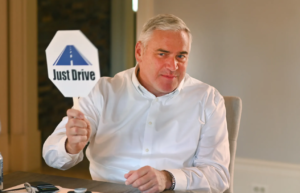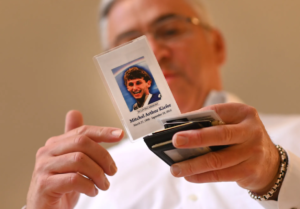‘Just Drive’: Son’s Death Fuels GM Executive’s Push Against Distracted Driving
January 20, 2022Steven Kiefer would still like to know why his son died.
How Mitchel died is painfully clear. The how led to the launch of the Kiefer Foundation and its crusade against distracted driving, a sometimes rewarding and frequently frustrating campaign to keep cellphones out of the hands of people who likely realize the danger but let their eyes and attention wander anyway.
The why only one person knows: the woman who smashed into the back of his car at 81 mph.
Mitchel was 18, a Michigan State University freshman headed back to school in mid-September 2016. He was westbound on Interstate 96 between Webberville and Williamston, a stretch in Ingham County where the highway briefly veers north and brake lights often glow even after the road straightens again.
 He was driving a new Chevrolet Malibu, the kind of car you enjoy when your dad is on his way to becoming president of GM International. Behind him, in an older Pontiac, was 21-year-old Western Michigan student Kelley Lange.
He was driving a new Chevrolet Malibu, the kind of car you enjoy when your dad is on his way to becoming president of GM International. Behind him, in an older Pontiac, was 21-year-old Western Michigan student Kelley Lange.
“What was so important?” Kiefer wonders. Why was she tapping out a text or reading an email or whatever else it was that kept her from noticing that traffic had nearly come to a stop?
She never touched the brakes.
The impact launched the dark blue Malibu across a 52-foot-wide grassy median into oncoming traffic. A white Chevrolet pickup hauling a horse trailer loaded with construction tools hit the sedan broadside.
Lange was treated for minor injuries at a hospital. Mitchel was buried at a small cemetery near Kiefer’s home in Northville.
Officially, an average of nine people per day die in crashes involving distracted driving, according to the National Highway Transportation Safety Administration — 3,142 nationally in the last year tallied, 71 of them in Michigan. Also according to NHTSA, the actual figures are probably much more than that.
“There are challenges with recording distracted driving information,” said Robert Ritter, who directs the agency’s office of impaired driving and occupant protection.
Statistics are based on accounts from police on site. Reports and reporting differ by state, Ritter said, “and oftentimes, the officer can’t collect that information, particularly if the driver was one of the fatalities.”
The same issues arise with injuries, 424,000 by official count in 2019 and multiples of that in reality.
Cellphones are an obvious contributor to the grim accounting, and Kiefer has been promoting a package of bills to make anything but hands-free use illegal for drivers. But many other distractions don’t require a microchip.
Eating, smoking, turning to talk to a passenger. Putting on makeup, reading, checking a map.
“Driving is a complex task,” Ritter said. “It really does require our full concentration.”
When attention wanes at the wrong time and place, families mourn.
Mitchel was the second of four children of Steve and Paula Kiefer, who, though divorced, live a short walk from one another.
A portrait on his father’s mantle, painted from a photograph, shows him in jubilation in his Detroit Catholic Central High School hockey uniform, the backup goalie beaming after the Shamrocks won the 2016 state championship.
At USA Hockey Arena in Plymouth where that game took place, skates now flash across a surface named the Mitchel Kiefer Memorial Rink. But his wounded father wanted more.
Kiefer commissioned plans for a $10 million ice rink and sports complex on the Catholic Central campus in Novi to bear Mitchel’s name. He began pondering ways to raise the money. And then he stopped.
A sports complex is nice, but whose life does it save? 
“We can mourn,” he had told his surviving kids, “or we can make something.” In this case, they could make a difference.
The Kiefer Foundation works in three areas: attention to the problem and perils of distracted driving, public policy, and technology. One of its first successes was splitting a $600,000 tab with the state to install 1.7 miles of cable guard rail on the stretch where Mitchel died.
In the first month, Kiefer said, a driver careening across the median took out four posts — and stopped. In the first year, the cables were struck a dozen times.
His goal was to have the rail in place before the first snowfall after the crash. It took until the following August. At a Mackinac Policy Conference, he guaranteed to Gov. Gretchen Whitmer that the cluster of three distracted driving bills would be signed by the fifth anniversary of Mitchel’s death in 2021. It’s still adrift in the Michigan House, awaiting compromise with a minority of the Republican majority.
So Kiefer, 58, has vexations. But he also has influence, access, and allies; General Motors CEO Mary Barra and NFL quarterback Tom Brady have recorded supportive videos for the foundation website, and state Rep. Roger Hauck, a Union Township Republican whose mother-in-law was killed by a suspected distracted driver, is among his supporters at the capital.
And he has numbers.
Offender to Crusader
 Kiefer concedes that before he was a crusader, he was an offender.
Kiefer concedes that before he was a crusader, he was an offender.
Six years ago, he said, “you would have seen me driving around in a yellow Corvette convertible, steering with my knee, holding a cup of coffee, looking at my phone.”
He still owns the car. He, older son Blake and Mitchel built the engine themselves at the factory in Bowling Green, Kentucky, a $5,000 option. But tragedy and research have stripped away the bad habits.
AAA Michigan and NHTSA cite studies that show distracted driving deaths on the rise, even as alcohol-related fatalities fall. Texting behind the wheel makes a wreck 23 times more likely — at that point, barely even an accident.
“Looking away from the road for just two seconds doubles the risk of a crash,” warned AAA spokeswoman Adrienne Woodland. “Five seconds of reading an email or text is like driving the length of a football field blindfolded.”
A policy survey for the Detroit Regional Chamber in 2020 showed that 88% of Michigan voters polled favor a law prohibiting holding cellphones while driving and requiring any usage to be hands-free.
Similar laws are already in place in 24 states along with Washington, D.C., Puerto Rico, Guam, and the U.S. Virgin Islands. In Michigan, Kelsey’s Law — named for 17-year-old Kelsey Raffaele of Sault Ste. Marie, who died in a crash while making a phone call — makes cellphone use illegal except for emergencies, and a statute from 2010 prohibits texting.
Kelsey’s Law, however, applies only to beginning drivers, and the other is outmoded and unenforceable.
“The problem with the current law is that it specifically says texting and driving,” said Tiffany Hauser, the director of government relations for AAA. “We do so many other things with our phones now. Are they texting, or are they streaming? Are they on social media?”
It’s impossible for a passing police officer to tell. Hands-free use is not risk-free, Hauser said, but eyes-front is preferable to eyes-down, and detection for law enforcement would become significantly easier at the same time distracted driving rose to a primary offense.
House Bills 4277-79, introduced in April 2021, cleared the House Judiciary Committee but ran into opposition from several Republican legislators, said Hauser and Hauck.
Older cars aren’t Bluetooth-enabled, one representative pointed out. Others, in a time of objection to compulsory masks and vaccines, were wary of any government mandate.
Compromises are being negotiated, Hauck said, with proposals including a six-month pause on enforcement “so everybody can get used to it,” and a sunset clause so police can determine whether the law truly cuts down on crashes.
Hauck, 60, shared a wall with his mother-in-law at a duplex in Isabella County. Marsha David was coming back from the mailbox across the street when she was struck by a car whose driver, according to a witness, was gazing at his phone.
Hauck had to identify her body and then tell his wife her mother was dead.
He’s wary of infringing on personal freedom, he said, but driving is a privilege, not a right.
“What about my mother-in-law’s rights?” Hauck asked. “They were taken away forever.”
A Fight for All of Us
Hauck’s brother-in-law drives a semi for a living, “and he says everybody is texting.”
Ritter, the nervous father of a daughter with a learner’s permit, sees the swerving or uneven pace of drivers clearly tinkering with phones, “and it drives me nuts.”
In those cases, advised the NHTSA safety expert, “be aware that if the other driver is not necessarily paying attention, you need to be. If somebody is engaging in truly dangerous behavior, you can pull off the road and contact law enforcement.”
NHTSA has launched a high-profile campaign with a 15-letter message, “U Drive. U Text. U Pay.”
Kiefer’s slogan is even more direct: “Just Drive.”
The motto has appeared on billboards and on a website the foundation launched called handsfreemichigan.org. It’s on fan-sized paddles suitable for display in vehicle windows or flashing at other drivers — though Kiefer suggests restraint with that direct approach.
He’s more likely to speak up from the back seat of a limo or an Uber.
“I tell them politely to stop,” he said, “and I tell them why.” Then he’ll reach into his pocket for a “Just Drive” cell phone knob or a $5 adhesive bracket that turns an air conditioning vent into a hands-free mount.
“Just telling people it’s dangerous doesn’t solve the problem,” Kiefer said. Whatever else he needs to do, he will.
“He’s very intense. Very committed. Very knowledgeable,” said his friend, Leon Richardson, president of the Tier One supplier Chemico Group. “He is truly committed to people’s safety.”
Being responsible for GM operations everywhere but North America and China opens doors. Kiefer has driven home his message on the “Today” show and the editorial page of USA Today.
The campaign began with his son, Richardson said, but across countless public appearances, he makes it clear that “this is not a fight for Mitchel. It’s a fight for all of us.”
A Future Doctor
Mitchel was a bit of an old soul, Kiefer said, more cautious by nature than the older brother who used to fire pucks at him.
 He was born in Tokyo while his dad was posted there with GM and lived in Luxembourg twice. Maybe because of his well-traveled background, he was adaptable and hard to ruffle.
He was born in Tokyo while his dad was posted there with GM and lived in Luxembourg twice. Maybe because of his well-traveled background, he was adaptable and hard to ruffle.
His plan was to study neuroscience and become a doctor. He’d likely be in medical school today.
The woman who changed everything lives in Livingston County and works in outside sales for an oil company. She declined to comment about the crash or its aftermath.
Lange pleaded guilty to a charge of moving violation causing death, a misdemeanor. The sentence was two years probation, 24 days of community service, and a $1,900 fine.
The prosecutor asked the Kiefers if they wanted her to go to jail. “I thought about it,” Steve Kiefer said, but she was working two jobs and her family seemed solid, “and what good does it do?”
At the sentencing, her lawyer asked if Kiefer would be willing to speak with Lange, then walked her over.
“She was shaking, sobbing, hysterical,” Kiefer said. She fell against his broad chest.
“Here’s the girl who killed my son,” he thought, and he held her.
In the moment, he did not think to ask his question. He still does not know why Mitchel died. But he knows what he has to do.
This article was originally published in The Detroit News. View the original story.
